济慈生平的英文介绍
John keats

Bright star
• Of snow upon the mountains and the moors--No---yet still stedfast, still unchangeable, Pillowed upon my fair love's ripening breast, To feel for ever its soft fall and swell, Awake for ever in a sweet unrest, Still, still to hear her tender-taken breath, And so live ever---or else swoon to death. • 灿烂、轻盈,覆盖着洼地和 高山—— 呵,不,——我只愿坚 定不移地 以头枕在爱人酥软的胸 脯上, 永远感到它舒缓地降落、 升起; 而醒来,心里充满甜蜜 的激荡, 不断,不断听着她细腻 的呼吸, 就这样活着,——或昏 迷地死去。 查良铮 译
Major Literary Works
• In John Keats’ short writing career of six or seven years, he produced a variety of kinds of works, including epic, lyric and narrative poems. • Except his first poem, Lines in Imitation of Spenser (1814) and his first book, Poems, published in 1817, his major works can be divided into the five long poems and the short ones.
To Fanny Brawne
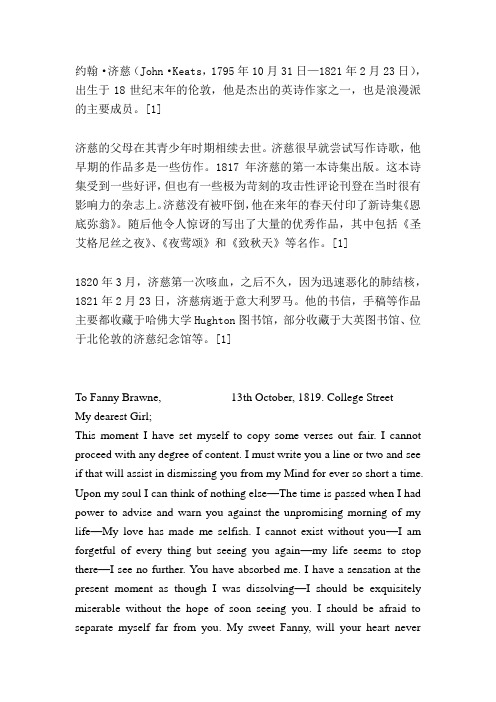
约翰·济慈(John·Keats,1795年10月31日—1821年2月23日),出生于18世纪末年的伦敦,他是杰出的英诗作家之一,也是浪漫派的主要成员。
[1]济慈的父母在其青少年时期相续去世。
济慈很早就尝试写作诗歌,他早期的作品多是一些仿作。
1817年济慈的第一本诗集出版。
这本诗集受到一些好评,但也有一些极为苛刻的攻击性评论刊登在当时很有影响力的杂志上。
济慈没有被吓倒,他在来年的春天付印了新诗集《恩底弥翁》。
随后他令人惊讶的写出了大量的优秀作品,其中包括《圣艾格尼丝之夜》、《夜莺颂》和《致秋天》等名作。
[1]1820年3月,济慈第一次咳血,之后不久,因为迅速恶化的肺结核,1821年2月23日,济慈病逝于意大利罗马。
他的书信,手稿等作品主要都收藏于哈佛大学Hughton图书馆,部分收藏于大英图书馆、位于北伦敦的济慈纪念馆等。
[1]To Fanny Brawne, 13th October, 1819. College StreetMy dearest Girl;This moment I have set myself to copy some verses out fair. I cannot proceed with any degree of content. I must write you a line or two and see if that will assist in dismissing you from my Mind for ever so short a time. Upon my soul I can think of nothing else—The time is passed when I had power to advise and warn you against the unpromising morning of my life—My love has made me selfish. I cannot exist without you—I am forgetful of every thing but seeing you again—my life seems to stop there—I see no further. You have absorbed me. I have a sensation at the present moment as though I was dissolving—I should be exquisitely miserable without the hope of soon seeing you. I should be afraid to separate myself far from you. My sweet Fanny, will your heart neverchange? My love, will it? I have no limit now to my love. Do not threat me even in jest. I have been astonished that Men could die Martyrs for religion—I have shuddered at it—I shudder no more—I could be martyred for my religion—Love is my religion—I could die for that—I could die for you. My creed is love and you are its only tenet—You have ravished me away by a Power I cannot resist: and yet I could resist till I saw you; and even since I have seen you I have endeavoured often “to reason against the reasons of my love.” I can do that no more—the pain will be too great—My love is selfish—I can not breathe without you. Yours foreverJohn Keats我亲爱的姑娘:此刻我正准备撰写几个诗节。
外国文艺美学要略·人物·济慈
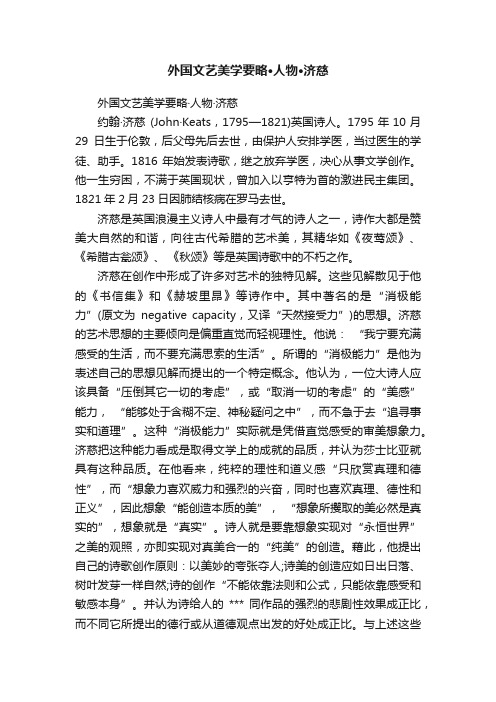
外国文艺美学要略·人物·济慈外国文艺美学要略·人物·济慈约翰·济慈(John·Keats,1795—1821)英国诗人。
1795年10月29日生于伦敦,后父母先后去世,由保护人安排学医,当过医生的学徒、助手。
1816年始发表诗歌,继之放弃学医,决心从事文学创作。
他一生穷困,不满于英国现状,曾加入以亨特为首的激进民主集团。
1821年2月23日因肺结核病在罗马去世。
济慈是英国浪漫主义诗人中最有才气的诗人之一,诗作大都是赞美大自然的和谐,向往古代希腊的艺术美,其精华如《夜莺颂》、《希腊古瓮颂》、《秋颂》等是英国诗歌中的不朽之作。
济慈在创作中形成了许多对艺术的独特见解。
这些见解散见于他的《书信集》和《赫坡里昂》等诗作中。
其中著名的是“消极能力”(原文为negative capacity,又译“天然接受力”)的思想。
济慈的艺术思想的主要倾向是偏重直觉而轻视理性。
他说:“我宁要充满感受的生活,而不要充满思索的生活”。
所谓的“消极能力”是他为表述自己的思想见解而提出的一个特定概念。
他认为,一位大诗人应该具备“压倒其它一切的考虑”,或“取消一切的考虑”的“美感”能力,“能够处于含糊不定、神秘疑问之中”,而不急于去“追寻事实和道理”。
这种“消极能力”实际就是凭借直觉感受的审美想象力。
济慈把这种能力看成是取得文学上的成就的品质,并认为莎士比亚就具有这种品质。
在他看来,纯粹的理性和道义感“只欣赏真理和德性”,而“想象力喜欢威力和强烈的兴奋,同时也喜欢真理、德性和正义”,因此想象“能创造本质的美”,“想象所攫取的美必然是真实的”,想象就是“真实”。
诗人就是要靠想象实现对“永恒世界”之美的观照,亦即实现对真美合一的“纯美”的创造。
藉此,他提出自己的诗歌创作原则:以美妙的夸张夺人;诗美的创造应如日出日落、树叶发芽一样自然;诗的创作“不能依靠法则和公式,只能依靠感受和敏感本身”。
济慈生平简介(英文版)及部分诗作

John Keats (1795-1821), renowned poet of the English Romantic Movement, wrote some of the greatest English language poems including "La Belle Dame Sans Merci", "Ode To A Nightingale", and "Ode On a Grecian Urn";O Attic shape! Fair attitude! with bredeOf marble men and maidens overwrought,With forest branches and the trodden weed;Thou, silent form, dost tease us out of thoughtAs doth eternity: Cold pastoral!When old age shall this generation waste,Thou shalt remain, in midst of other woeThan ours, a friend to man, to whom thou sayst,"Beauty is truth, truth beauty,--that is allYe know on earth, and all ye need to know."、John Keats was born on 31 October 1795 in Moorgate, London, England, the first child born to Frances Jennings (b.1775-d.1810) and Thomas Keats (d.1804), an employee of a livery stable. He had three siblings: George (1797-1841), Thomas (1799-1818), and Frances Mary "Fanny" (1803-1889). After leaving school in Enfield, Keats went on to apprentice with Dr. Hammond, a surgeon in Edmonton. After his father died in a riding accident, and his mother died of tuberculosis, John and his brothers moved to Hampstead. It was here that Keats met Charles Armitage Brown (1787-1842) who would become a great friend. Remembering his first meeting with him, Brown writes "His full fine eyes were lustrously intellectual, and beaming (at that time!)". Much grieved by his death, Brown worked for many years on his memoir and biography, Life of John Keats (1841). In it Brown claims that it was not until Keats read Edmund Spencer's Faery Queen that he realised his own gift for the poetic. Keats was an avid student in the fields of medicine and natural history, but he then turned his attentions to the literary works of such authors as William Shakespeare and Geoffrey Chaucer.Keats had his poems published in the magazines of the day at the encouragement of many including James Henry Leigh Hunt Esq. (1784-1859), editor of the Examiner and to whom Keats dedicated his first collection Poems (1817). It includes "To My Brother George", "O Solitude! If I Must With Thee Dwell", and "Happy is England! I Could Be Content". Upon its appearance a series of personal attacks directed at Keats ensued in the pages of Blackwood's Magazine. Despite the controversy surrounding his life, Keats's literary merit prevailed. That sameto stay with him and his family in Italy, he declined. When Shelley's body was washed ashore after drowning, a volume of Keats's poetry was found in his pocket.Having worked on it for many months, Keats finished his epic poem comprising four books, Endymion: A Poetic Romance--"A thing of beauty is a joy for ever"--in 1818. That summer he travelled to the Lake District of England and on to Ireland and Scotland on a walking tour with Brown. They visited the grave of Robert Burns and reminisced upon John Milton's poetry. While he was not aware of the seriousness of it, Keats was suffering from the initial stages of the deadly infectious disease tuberculosis. He cut his trip short and upon return to Hampstead immediately tended to his brother Tom who was then in the last stages of the disease. After Tom's death in December of 1818, Keats lived with Brown.Life of John Keats.Around this time Keats met, fell in love with, and became engaged to eighteen year old Frances "Fanny" Brawne (1800-1865). He wrote one of his more famous sonnets to her titled "Bright Star, would I were steadfast as thou art". While their relationship inspired much spiritual development for Keats, it also proved to be tempestuous, filled with the highs and lows from jealousy and infatuation of first love. Brown was not impressed and tried to provide some emotional stability to Keats. Many for a time were convinced that Fanny was the cause of his illness, or, used that as an excuse to try to keep her away from him. For a while even Keats entertained the possibility that he was merely suffering physical manifestations of emotional anxieties--but after suffering a hemorrhage he gave Fanny permission to break their engagement. She would hear nothing of it and by her word provided much comfort to Keats in his last days that she was ultimately loyal to him.Although 1819 proved to be his most prolific year of writing, Keats was also in dire financial straits. His brother George had borrowed money he could ill-afford to part with. His earning Fanny's mother's approval to marrydepended on his earning as a writer and he started plans with his publisher John Taylor (1781-1864) for his next volume of poems. At the beginning of 1820 Keats started to show more pronounced signs of the deadly tuberculosis that had killed his mother and brother. After a lung hemorrhage, Keats calmly accepted his fate, and he enjoyed several weeks of respite under Brown's watchful eye. As was common belief at the time that bleeding a patient was beneficial to healing, Keats was bled and given opium to relieve his anxiety and pain. He was at times put on a starvation diet, then at other times prescribed to eat meat and drink red wine to gain strength. Despite these ill-advised good-intentions, and suffering increasing weakness and fever, Keats was able to emerge from his fugue and organise the publication of his next volume of poetry.Lamia, Isabella, The Eve of St. Agnes, and Other Poems (1820) includes some of his best-known and oft-quoted works: "Hyperion", "To Autumn", and "Ode To A Nightingale". "Nightingale" evokes all the pain and suffering that Keats experienced during his short life-time: the death of his mother; the physical anguish he saw as a young apprentice tending to the sick and dying at St. Guy's Hospital; the death of his brother; and ultimately his own physical and spiritual suffering in love and illness. Keats lived to see positive reviews of Lamia, even in Blackwood's magazine. But the positivity was not to last long; Brown left for Scotland and the ailing Keats lived with Hunt for a time. But it was unbearable to him and only exacerbated his condition--he was unable to see Fanny, so, when he showed up at the Brawne's residence in much emotional agitation, sick, and feverish, they could not refuse him. He enjoyed a month with them, blissfully under the constant care of his beloved Fanny. Possibly bolstered by his finally having unrestricted time with her, and able to imagine a happy future with her, Keats considered his last hope of recovery of a rest cure in the warm climes of Italy. As a parting gift Fanny gave him a piece of marble which she had often clasped to cool her hand. In September of 1820 Keats sailed to Rome with friend and painter Joseph Severn (1793-1879, who was unaware of his circumstances with Fanny and the gravity of his health.Keats put on a bold front but it soon became apparent to Severn that he was terminally ill. They stayed in rooms on the Piazza Navona near the Spanish Steps, and enjoyed the lively sights and sounds of the people and culture, but Keats soon fell into a deep depression. When his attending doctor James Clark (1788-1870) finally voiced aloud the grim prognosis, Keats's medical background came to the fore and he longed to end his life and avoid the humiliating physical and mental torments of tuberculosis. By early 1821 he was confined to bed, Severn a devoted nurse. Keats had resolved not to write to Fanny and would not read a letter from her for fear of the pain it would cause him, although he constantly clasped her marble. During bouts of coughing, fever, nightmares, Keats also tried to cheer his friend, who held him till the end.John Keats died on 23 February 1821 in Rome, Italy, and now rests in the Protestant Cemetery in Rome, by the pyramid of Caius Cestius, near his friend Shelley. His epitaph reads "Here lies one whose name was writ in water", inspired by the line "all your better deeds, Shall be in water writ" from Francis Beaumont (1584-1616) and John Fletcher's (1579-1625) five act play Philaster or: Love Lies A-bleeding. Just a year later, Shelley was buried in the same cemetery, not long after he had written "Adonais" (1821) in tribute to his friend;I weep for Adonais--he is dead!O, weep for Adonais! though our tearsThaw not the frost which binds so dear a head!And thou, sad Hour, selected from all yearsTo mourn our loss, rouse thy obscure compeers,And teach them thine own sorrow, say: "With meDied Adonais; till the Future daresForget the Past, his fate and fame shall beAn echo and a light unto eternity!"Fanny Brawne married in 1833 and died at the age of sixty-five. English poet and friend of Brown's, Richard Monckton Milnes (1809-1885) wrote Life, Letters, and Literary Remains of John Keats (1848). During his lifetime and since, John Keats inspired numerous other authors, poets, and artists, and remains one of the most widely read and studied 19th century poets.Biography written by C. D. Merriman for Jalic Inc. Copyright Jalic Inc. 2007. All Rights Reserved.Works:长篇叙事诗Endymion《恩底弥翁》;The Eve of St.Agnes《圣艾格尼丝节前夜》;Lamia《拉米亚》;(颂诗)Ode to Psyche《普赛克颂》;《希腊古瓮颂》Sleep and Poetry《睡与诗》"As I lay in my bed slepe full unmete Was unto me, but why that I ne might Rest I ne wist, for there n'as erthly wight[As I suppose] had more of hertis ese Than I, for I n'ad sicknesse nor disese."CHAUCER.What is more gentle than a wind in summer? What is more soothing than the pretty hummer That stays one moment in an open flower,And buzzes cheerily from bower to bower?What is more tranquil than a musk-rose blowing In a green island, far from all men's knowing? More healthful than the leafiness of dales?More secret than a nest of nightingales?More serene than Cordelia's countenance?More full of visions than a high romance? What, but thee Sleep? Soft closer of our eyes! Low murmurer of tender lullabies!Light hoverer around our happy pillows! Wreather of poppy buds, and weeping willows! Silent entangler of a beauty's tresses!Most happy listener! when the morning blesses Thee for enlivening all the cheerful eyesThat glance so brightly at the new sun-rise. But what is higher beyond thought than thee? Fresher than berries of a mountain tree?More strange, more beautiful, more smooth, more regal,Than wings of swans, than doves, than dim-seen eagle?What is it? And to what shall I compare it?It has a glory, and nought else can share it:The thought thereof is awful, sweet, and holy, Chacing away all worldliness and folly;Coming sometimes like fearful claps of thunder,Or the low rumblings earth's regions under;And sometimes like a gentle whisperingOf all the secrets of some wond'rous thingThat breathes about us in the vacant air;So that we look around with prying stare,Perhaps to see shapes of light, aerial lymning,And catch soft floatings from a faint-heard hymning; To see the laurel wreath, on high suspended,That is to crown our name when life is ended. Sometimes it gives a glory to the voice,And from the heart up-springs, rejoice! rejoice! Sounds which will reach the Framer of all things, And die away in ardent mutterings.No one who once the glorious sun has seen,And all the clouds, and felt his bosom cleanFor his great Maker's presence, but must know What 'tis I mean, and feel his being glow:Therefore no insult will I give his spirit,By telling what he sees from native merit.O Poesy! for thee I hold my penThat am not yet a glorious denizenOf thy wide heaven--Should I rather kneelUpon some mountain-top until I feelA glowing splendour round about me hung,And echo back the voice of thine own tongue?O Poesy! for thee I grasp my penThat am not yet a glorious denizenOf thy wide heaven; yet, to my ardent prayer, Yield from thy sanctuary some clear air, Smoothed for intoxication by the breathOf flowering bays, that I may die a deathOf luxury, and my young spirit followThe morning sun-beams to the great ApolloLike a fresh sacrifice; or, if I can bearThe o'erwhelming sweets, 'twill bring to me the fair Visions of all places: a bowery nookWill be elysium--an eternal bookWhence I may copy many a lovely sayingAbout the leaves, and flowers--about the playing Of nymphs in woods, and fountains; and the shade Keeping a silence round a sleeping maid;And many a verse from so strange influenceThat we must ever wonder how, and whenceIt came. Also imaginings will hoverRound my fire-side, and haply there discover Vistas of solemn beauty, where I'd wanderIn happy silence, like the clear meanderThrough its lone vales; and where I found a spot Of awfuller shade, or an enchanted grot,Or a green hill o'erspread with chequered dressOf flowers, and fearful from its loveliness,Write on my tablets all that was permitted,All that was for our human senses fitted.Then the events of this wide world I'd seizeLike a strong giant, and my spirit teazeTill at its shoulders it should proudly seeWings to find out an immortality. Stop and consider! life is but a day;A fragile dew-drop on its perilous wayFrom a tree's summit; a poor Indian's sleep While his boat hastens to the monstrous steepOf Montmorenci. Why so sad a moan?Life is the rose's hope while yet unblown;The reading of an ever-changing tale;The light uplifting of a maiden's veil;A pigeon tumbling in clear summer air;A laughing school-boy, without grief or care, Riding the springy branches of an elm.O for ten years, that I may overwhelmMyself in poesy; so I may do the deedThat my own soul has to itself decreed.Then will I pass the countries that I seeIn long perspective, and continuallyTaste their pure fountains. First the realm I'll pass Of Flora, and old Pan: sleep in the grass,Feed upon apples red, and strawberries,And choose each pleasure that my fancy sees; Catch the white-handed nymphs in shady places, To woo sweet kisses from averted faces,--Play with their fingers, touch their shoulders white Into a pretty shrinking with a biteAs hard as lips can make it: till agreed,A lovely tale of human life we'll read.And one will teach a tame dove how it bestMay fan the cool air gently o'er my rest; Another, bending o'er her nimble tread,Will set a green robe floating round her head, And still will dance with ever varied case,Smiling upon the flowers and the trees:Another will entice me on, and onThrough almond blossoms and rich cinnamon;Till in the bosom of a leafy worldWe rest in silence, like two gems upcurl'dIn the recesses of a pearly shell.And can I ever bid these joys farewell?Yes, I must pass them for a nobler life,Where I may find the agonies, the strifeOf human hearts: for lo! I see afar,O'er sailing the blue cragginess, a carAnd steeds with streamy manes--the charioteer Looks out upon the winds with glorious fear:And now the numerous tramplings quiver lightly Along a huge cloud's ridge; and now with sprightly Wheel downward come they into fresher skies,Tipt round with silver from the sun's bright eyes. Still downward with capacious whirl they glide, And now I see them on a green-hill's sideIn breezy rest among the nodding stalks.The charioteer with wond'rous gesture talksTo the trees and mountains; and there soon appear Shapes of delight, of mystery, and fear,Passing along before a dusky spaceMade by some mighty oaks: as they would chase Some ever-fleeting music on they sweep.Lo! how they murmur, laugh, and smile, and weep: Some with upholden hand and mouth severe; Some with their faces muffled to the earBetween their arms; some, clear in youthful bloom, Go glad and smilingly, athwart the gloom;Some looking back, and some with upward gaze; Yes, thousands in a thousand different waysFlit onward--now a lovely wreath of girlsDancing their sleek hair into tangled curls;And now broad wings. Most awfully intentThe driver, of those steeds is forward bent,And seems to listen: O that I might knowAll that he writes with such a hurrying glow.The visions all are fled--the car is fledInto the light of heaven, and in their steadA sense of real things comes doubly strong,And, like a muddy stream, would bear alongMy soul to nothingness: but I will striveAgainst all doublings, and will keep aliveThe thought of that same chariot, and the strange Journey it went.Is there so small a rangeIn the present strength of manhood, that the high Imagination cannot freely flyAs she was wont of old? prepare her steeds, Paw up against the light, and do strange deeds Upon the clouds? Has she not shewn us all? From the clear space of ether, to the small Breath of new buds unfolding? From the meaning Of Jove's large eye-brow, to the tender greening Of April meadows? Here her altar shone,E'en in this isle; and who could paragonThe fervid choir that lifted up a noiseOf harmony, to where it aye will poiseIts mighty self of convoluting sound,Huge as a planet, and like that roll round, Eternally around a dizzy void?Ay, in those days the Muses were nigh cloy'd With honors; nor had any other careThan to sing out and sooth their wavy hair.Could all this be forgotten? Yes, a schism Nurtured by foppery and barbarism,Made great Apollo blush for this his land.Men were thought wise who could not understand His glories: with a puling infant's forceThey sway'd about upon a rocking horse,And thought it Pegasus. Ah dismal soul'd!The winds of heaven blew, the ocean roll'dIts gathering waves--ye felt it not. The blue Bared its eternal bosom, and the dewOf summer nights collected still to makeThe morning precious: beauty was awake!Why were ye not awake? But ye were deadTo things ye knew not of,--were closely wedTo musty laws lined out with wretched ruleAnd compass vile: so that ye taught a schoolOf dolts to smooth, inlay, and clip, and fit,Till, like the certain wands of Jacob's wit,Their verses tallied. Easy was the task:A thousand handicraftsmen wore the maskOf Poesy. Ill-fated, impious race!That blasphemed the bright Lyrist to his face, And did not know it,--no, they went about, Holding a poor, decrepid standard outMark'd with most flimsy mottos, and in largeThe name of one Boileau!O ye whose chargeIt is to hover round our pleasant hills!Whose congregated majesty so fillsMy boundly reverence, that I cannot traceYour hallowed names, in this unholy place,So near those common folk; did not their shames Affright you? Did our old lamenting Thames Delight you? Did ye never cluster roundDelicious Avon, with a mournful sound,And weep? Or did ye wholly bid adieuTo regions where no more the laurel grew?Or did ye stay to give a welcomingTo some lone spirits who could proudly singTheir youth away, and die? 'Twas even so:But let me think away those times of woe:Now 'tis a fairer season; ye have breathedRich benedictions o'er us; ye have wreathedFresh garlands: for sweet music has been heardIn many places;--some has been upstirr'dFrom out its crystal dwelling in a lake,By a swan's ebon bill; from a thick brake,Nested and quiet in a valley mild,Bubbles a pipe; fine sounds are floating wildAbout the earth: happy are ye and glad.These things are doubtless: yet in truth we've had Strange thunders from the potency of song; Mingled indeed with what is sweet and strong, From majesty: but in clear truth the themesAre ugly clubs, the Poets PolyphemesDisturbing the grand sea. A drainless showerOf light is poesy; 'tis the supreme of power;'Tis might half slumb'ring on its own right arm. The very archings of her eye-lids charmA thousand willing agents to obey,And still she governs with the mildest sway:But strength alone though of the Muses bornIs like a fallen angel: trees uptorn,Darkness, and worms, and shrouds, and sepulchres Delight it; for it feeds upon the burrs,And thorns of life; forgetting the great endOf poesy, that it should be a friendTo sooth the cares, and lift the thoughts of man. Yet I rejoice: a myrtle fairer thanE'er grew in Paphos, from the bitter weedsLifts its sweet head into the air, and feedsA silent space with ever sprouting green.All tenderest birds there find a pleasant screen, Creep through the shade with jaunty fluttering, Nibble the little cupped flowers and sing.Then let us clear away the choaking thornsFrom round its gentle stem; let the young fawns, Yeaned in after times, when we are flown,Find a fresh sward beneath it, overgrownWith simple flowers: let there nothing beMore boisterous than a lover's bended knee; Nought more ungentle than the placid lookOf one who leans upon a closed book;Nought more untranquil than the grassy slopes Between two hills. All hail delightful hopes!As she was wont, th' imaginationInto most lovely labyrinths will be gone,And they shall be accounted poet kingsWho simply tell the most heart-easing things.O may these joys be ripe before I die.Will not some say that I presumptuouslyHave spoken? that from hastening disgrace'Twere better far to hide my foolish face?That whining boyhood should with reverence bow Ere the dread thunderbolt could reach? How!If I do hide myself, it sure shall beIn the very fane, the light of Poesy:If I do fall, at least I will be laidBeneath the silence of a poplar shade;And over me the grass shall be smooth shaven; And there shall be a kind memorial graven.But oft' Despondence! miserable bane!They should not know thee, who athirst to gain A noble end, are thirsty every hour.What though I am not wealthy in the dowerOf spanning wisdom; though I do not knowThe shiftings of the mighty winds, that blow Hither and thither all the changing thoughtsOf man: though no great minist'ring reason sorts Out the dark mysteries of human soulsTo clear conceiving: yet there ever rollsA vast idea before me, and I gleanTherefrom my liberty; thence too I've seenThe end and aim of Poesy. 'Tis clearAs any thing most true; as that the yearIs made of the four seasons--manifestAs a large cross, some old cathedral's crest, Lifted to the white clouds. Therefore should IBe but the essence of deformity,A coward, did my very eye-lids winkAt speaking out what I have dared to think.Ah! rather let me like a madman runOver some precipice; let the hot sunMelt my Dedalian wings, and drive me down Convuls'd and headlong! Stay! an inward frown Of conscience bids me be more calm awhile.An ocean dim, sprinkled with many an isle, Spreads awfully before me. How much toil!How many days! what desperate turmoil!Ere I can have explored its widenesses.Ah, what a task! upon my bended knees,I could unsay those--no, impossible! Impossible!For sweet relief I'll dwellOn humbler thoughts, and let this strange assay Begun in gentleness die so away.E'en now all tumult from my bosom fades:I turn full hearted to the friendly aidsThat smooth the path of honour; brotherhood, And friendliness the nurse of mutual good.The hearty grasp that sends a pleasant sonnet Into the brain ere one can think upon it;The silence when some rhymes are coming out; And when they're come, the very pleasant rout: The message certain to be done to-morrow.'Tis perhaps as well that it should be to borrow Some precious book from out its snug retreat, To cluster round it when we next shall meet. Scarce can I scribble on; for lovely airsAre fluttering round the room like doves in pairs; Many delights of that glad day recalling,When first my senses caught their tender falling. And with these airs come forms of elegance Stooping their shoulders o'er a horse's prance, Careless, and grand--fingers soft and round Parting luxuriant curls;--and the swift bound Of Bacchus from his chariot, when his eye Made Ariadne's cheek look blushingly.Thus I remember all the pleasant flowOf words at opening a portfolio.Things such as these are ever harbingersTo trains of peaceful images: the stirsOf a swan's neck unseen among the rushes:A linnet starting all about the bushes:A butterfly, with golden wings broad parted, Nestling a rose, convuls'd as though it smarted With over pleasure--many, many more,Might I indulge at large in all my storeOf luxuries: yet I must not forgetSleep, quiet with his poppy coronet:For what there may be worthy in these rhymes I partly owe to him: and thus, the chimesOf friendly voices had just given placeTo as sweet a silence, when I 'gan retraceThe pleasant day, upon a couch at ease.It was a poet's house who keeps the keysOf pleasure's temple. Round about were hung The glorious features of the bards who sungIn other ages--cold and sacred bustsSmiled at each other. Happy he who trustsTo clear Futurity his darling fame!Then there were fauns and satyrs taking aim At swelling apples with a frisky leapAnd reaching fingers, 'mid a luscious heapOf vine leaves. Then there rose to view a fane Of liny marble, and thereto a trainOf nymphs approaching fairly o'er the sward: One, loveliest, holding her white band toward The dazzling sun-rise: two sisters sweet Bending their graceful figures till they meet Over the trippings of a little child:And some are hearing, eagerly, the wild Thrilling liquidity of dewy piping.See, in another picture, nymphs are wipingCherishingly Diana's timorous limbs;--A fold of lawny mantle dabbling swimsAt the bath's edge, and keeps a gentle motionWith the subsiding crystal: as when oceanHeaves calmly its broad swelling smoothiness o'er Its rocky marge, and balances once moreThe patient weeds; that now unshent by foamFeel all about their undulating home.Sappho's meek head was there half smiling downAt nothing; just as though the earnest frownOf over thinking had that moment goneFrom off her brow, and left her all alone.Great Alfred's too, with anxious, pitying eyes,As if he always listened to the sighsOf the goaded world; and Kosciusko's wornBy horrid suffrance--mightily forlorn.Petrarch, outstepping from the shady green,Starts at the sight of Laura; nor can weanHis eyes from her sweet face. Most happy they!For over them was seen a free displayOf out-spread wings, and from between them shone The face of Poesy: from off her throneShe overlook'd things that I scarce could tell.The very sense of where I was might wellKeep Sleep aloof: but more than that there came Thought after thought to nourish up the flame Within my breast; so that the morning light Surprised me even from a sleepless night;And up I rose refresh'd, and glad, and gay, Resolving to begin that very dayThese lines; and howsoever they be done,I leave them as a father does his son. Ode to a Nightingale《夜莺颂》My heart aches, and a drowsy numbness painsMy sense, as though of hemlock I had drunk,Or emptied some dull opiate to the drainsOne minute past, and Lethe-wards had sunk:'Tis not through envy of thy happy lot,But being too happy in thy happiness, -That thou, light-winged Dryad of the trees,In some melodious plotOf beechen green, and shadows numberless, Singest of summer in full-throated ease.O for a draught of vintage! that hath beenCooled a long age in the deep-delved earth,Tasting of Flora and the country-green,Dance, and Provencal song, and sunburnt mirth.O for a beaker full of the warm South,Full of the true, the blushful Hippocrene,With beaded bubbles winking at the brimAnd purple-stained mouth;That I might drink, and leave the world unseen,And with thee fade away into the forest dim.Fade far away, dissolve, and quite forgetWhat thou among the leaves hast never known,The weariness, the fever, and the fretHere, where men sit and hear each other groan; Where palsy shakes a few, sad, last grey hairs, Where youth grows pale, and spectre-thin, and dies; Where but to think is to be full of sorrowAnd leaden-eyed despairs;Where Beauty cannot keep her lustrous eyes,Or new Love pine at them beyond tomorrow.Away! away! for I will fly to thee,Not charioted by Bacchus and his pards,But on the viewless wings of Poesy,Though the dull brain perplexes and retards: Already with thee! tender is the night,And haply the Queen-Moon is on her throne, Clustered around by all her starry Fays;But here there is no lightSave what from heaven is with the breezes blown Through verdurous glooms and winding mossy ways.I cannot see what flowers are at my feet,Nor what soft incense hangs upon the boughs, But, in embalmed darkness, guess each sweet Wherewith the seasonable month endowsThe grass, the thicket, and the fruit-tree wild;White hawthorn, and the pastoral eglantine;Fast-fading violets covered up in leaves;And mid-May's eldest childThe coming musk-rose, full of dewy wine,The murmurous haunt of flies on summer eves. Darkling I listen; and for many a timeI have been half in love with easeful Death,Called him soft names in many a mused rhyme,To take into the air my quiet breath;Now more than ever seems it rich to die,To cease upon the midnight with no pain,While thou art pouring forth thy soul abroadIn such an ecstasy!Still wouldst thou sing, and I have ears in vain -To thy high requiem become a sod.Thou wast not born for death, immortal Bird!。
严济慈的简介和事迹
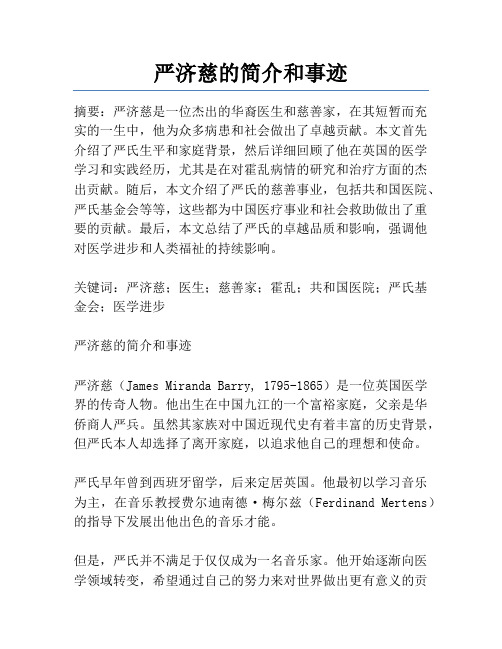
严济慈的简介和事迹摘要:严济慈是一位杰出的华裔医生和慈善家,在其短暂而充实的一生中,他为众多病患和社会做出了卓越贡献。
本文首先介绍了严氏生平和家庭背景,然后详细回顾了他在英国的医学学习和实践经历,尤其是在对霍乱病情的研究和治疗方面的杰出贡献。
随后,本文介绍了严氏的慈善事业,包括共和国医院、严氏基金会等等,这些都为中国医疗事业和社会救助做出了重要的贡献。
最后,本文总结了严氏的卓越品质和影响,强调他对医学进步和人类福祉的持续影响。
关键词:严济慈;医生;慈善家;霍乱;共和国医院;严氏基金会;医学进步严济慈的简介和事迹严济慈(James Miranda Barry, 1795-1865)是一位英国医学界的传奇人物。
他出生在中国九江的一个富裕家庭,父亲是华侨商人严兵。
虽然其家族对中国近现代史有着丰富的历史背景,但严氏本人却选择了离开家庭,以追求他自己的理想和使命。
严氏早年曾到西班牙留学,后来定居英国。
他最初以学习音乐为主,在音乐教授费尔迪南德·梅尔兹(Ferdinand Mertens)的指导下发展出他出色的音乐才能。
但是,严氏并不满足于仅仅成为一名音乐家。
他开始逐渐向医学领域转变,希望通过自己的努力来对世界做出更有意义的贡献。
1822年,严氏考取了爱丁堡大学医学院,并在此学习了七年的医学。
在医学院中,严氏表现出了其卓越的才华,获得了许多荣誉,成为该院历史上最年轻的博士。
回到英国后,严氏加入了英国军队,成为了一名军医。
他的医疗才能得到了充分的发挥,1817年,他一手创立了英国军队的霍乱疫苗接种计划,成功地控制了霍乱疫情。
这一研究和应用的创举,为英国军队的饮食卫生和防疫工作做出了巨大贡献,也为全球对于霍乱的预防和控制提供了有力的参考范本。
在户外生活时,严氏热情付出,总是不遗余力地救助那些需要帮助的人。
他曾在尼日利亚、海地、格陵兰等地区为当地饱受饥饿和疾病折磨的人民提供医疗救治。
严氏的出色表现,赢得了许多当地人的尊敬和爱戴。
英语学习资料:济慈经典英文诗:哦,孤独
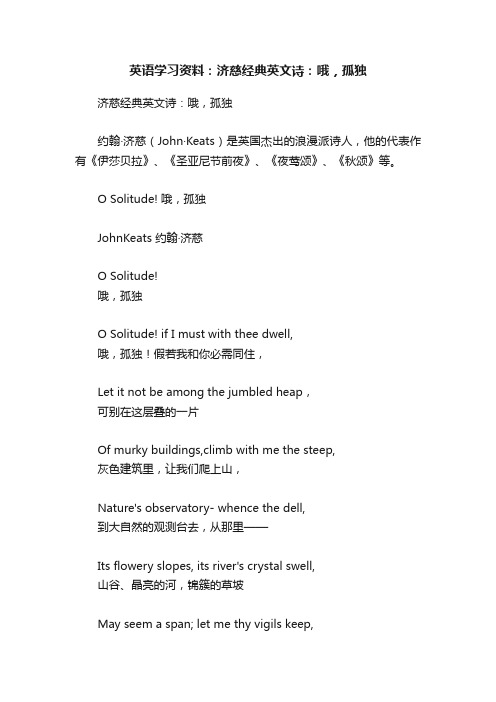
英语学习资料:济慈经典英文诗:哦,孤独济慈经典英文诗:哦,孤独约翰·济慈(John·Keats)是英国杰出的浪漫派诗人,他的代表作有《伊莎贝拉》、《圣亚尼节前夜》、《夜莺颂》、《秋颂》等。
O Solitude! 哦,孤独JohnKeats 约翰·济慈O Solitude!哦,孤独O Solitude! if I must with thee dwell,哦,孤独!假若我和你必需同住,Let it not be among the jumbled heap,可别在这层叠的一片Of murky buildings,climb with me the steep,灰色建筑里,让我们爬上山,Nature's observatory- whence the dell,到大自然的观测台去,从那里——Its flowery slopes, its river's crystal swell,山谷、晶亮的河,锦簇的草坡May seem a span; let me thy vigils keep,看来只是一拃;让我守着你Mongst boughs pavillion'd, where the deer's swift leap,在枝叶荫蔽下,看跳纵的鹿糜Startles the wild bee from the fox-glove bell.把指顶花蛊里的蜜蜂惊吓。
But though I'll gladly trace these scenes with thee,不过,虽然我喜欢和你赏玩Yet the sweet converse of an innocent mind,Whose words are images of thoughts refin'd,Is my soul's pleasure,这些景色,我的心灵更乐于和纯洁的心灵(她的言语是优美情思的表象)亲切会谈;and it sure must be,Almost the highest bliss of human-kind, 因为我相信,人的至高的乐趣When to thy haunts two kindred spirits flee.是一对心灵避入你的港湾。
约翰·济慈
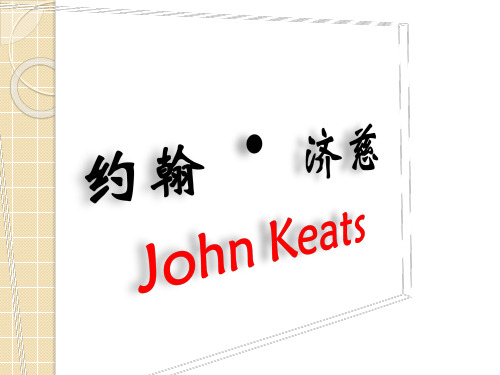
济慈诗才横溢,与雪莱、拜伦齐名。
美的事物是永恒的喜悦。 宁要充满感受的生活,而不 语 要充满思索的生活。
录
爱情中的甜浆可以抵消大量 的苦液,这就是对爱情的总 的褒誉。
代 表 作 品
长诗有《伊莎贝拉》、《圣亚尼节前夜》、 《许佩里恩》等 还有最脍炙人口的《夜莺颂》、《希腊古瓮 颂》、《秋赋》等诗歌。
John Keats-Ode To A Nightingale 约翰〃济慈-夜莺颂
My heart aches, and a drowsy numbness pains 我的心在痛,困顿和麻木 My sense, as though of hemlock I had drunk, 刺进了感官有如 饮过毒鸩 Or emptied some dull opiate to the drains 又像是刚把鸦片吞服 One minute past, and Lethewards had sunk: 于是向列斯忘川下沉 Tis not through envy of thy happy lot, 并不是我忌妒你的好运
赏 析
诗人的心是困顿和麻木的,又在那样的浊世。这时候诗 人听到了夜莺的嘹亮歌唱,如同令人振奋的神灵的呼声。 诗人的心被这样的歌声感染着,诗人的心同样也为现实 的污浊沉重打击着。诗人向往那森林繁茂,树阴斑驳、 夜莺欢唱的世界。他渴望饮下美妙的醇香美酒,愿意在 这样的世界里隐没,愿意舍弃自己困顿、疲乏和痛苦的 身体,诗人更愿意离开这污浊的社会。这是一个麻木的 现实,人们没有思想,因为任何的思索都会带来灰色的 记忆和忧伤的眼神。诗人听着夜莺曼妙的歌声,不再感 觉到自己身体的存在,早已魂离人间。 夜色温柔地向四方扩散,月亮悄悄地爬上枝头,但林中 仍然幽暗昏沉;微风轻吹,带领着诗人通过暗绿色的长 廊和幽微的曲径。曲径通幽,诗人仿佛来到了更加美妙 的世界,花朵错落有致地开放着,装点着香气弥漫的五 月。诗人并不知道这些花的名称,但诗人靠着心灵的启 发,靠着夜莺的指引,感受着深沉而宁静的世界。诗人 沉醉在这样的世界里,渴望着生命的终结,盼着夜莺带 着自己在这样的世界里常驻。
《济慈简介英文版》课件

Pursuit of a Medical Career
Details on Keats' decision to pursue a career in medicine.
Literary Work
Poetry Genres and Style
Exploration of the different genres and unique literary style present in Keats' poems.
Delving into the enduring impact of Keats' contributions to English literature.
Examining how Keats' work resonated with future poets and writers, shaping their own artistic endeavors.
Introduction
1 Who is John Keats?
An overview of John Keats and his significance in English literature.
2 Importance in English Literature
Exploration of the impact John Keats had on the literary world.
Friendship and Love Life
1
Friendship with Charles
Armitage Brown
Romantic Relationships and Love Letters
2
Examining the influential friendship between Keats and Charles Armitage Brown and its impact on his poetry.
JohnKeatswasborn...

16.John Keats was born in 1765in London,the first child born to a poor family.After leaving school,Keats went on to be an apprentice(学徒) for a surgeon.After his father died in a riding accident,and his mother died of tuberculosis(肺结核),John and his brothers moved to Hampstead where Keats met Charles Brown who would become a great friend.Keats had his poems published in the magazines of the day with the encouragement of many friends.Despite the impolite responses towards his early poems,Keats's literary gift prevailed.That same year Keats In 1818,he traveled to the Lake District of England and on to Ireland and Scotland on a walking tour with Brown.While he was not aware of the seriousness of it,Keats was suffering from the first stage of tubercu 婚) to eighteen-year-old Fanny Brawne.While their relationship led to much spiritual development for Keats,it also proved to be filled with the highs and lows of first love due to jealousy and stupidity.Many people once believed that 仅) suffering from emotional anxieties-but after suffering a hemorrhage(吐⾎) he agreed to break their engagement.At the beginning of 1820Keats started to show more signs of tuberculosis.His poem Ode to a Nightingale records all the pain and suffering that Keats experienced during his short lifetime:the death of his mother; the physical suffering he saw as a young apprentice caring for the sick and dying; the death of his brother; and finally his own physical and spiritual suffering in love and illness.John Keats died on 23February 1821in Rome,Italy,and now rests near his friend Shelly.His epitaph(碑⽂)reads‘Here lies one whose name was writ in water.'Keats inspired numerous other authors,poets,and artists,and remains one of the most widely read and studied 19th-century poets.Title John KeatsYear of (71)birth1765Family (72)background •His family was poor.•His father died of a riding accident.•His mother died of tuberculosis.Growing(73)experiences ●Keats was apprenticed to a local surgeon after (74)leaving school.●(75)Encouragedby his friends,he published his early poems,which showed his literary gift.●He was suffering from the first stage of tuberculosis without being aware that it was (76)serious.●Keats fell in love with Fanny Brawne and their relationship(77)resultedin his spiritual development.●He agreed to (78)break their engagement as a result of his illness.Year of death1821One of his Masterpiece:Ode to a NightingaleIt records all the pain and suffering that Keats (79)went through in his life time.His achievements Keats inspired many other authors,poets and artists,(80)remaining/regarded/considered as one of the most widely read and studied 19th-century poets.分析本⽂主要介绍约翰•济慈的⼀⽣,他出⽣于⼀个贫穷的家庭,⽗母双亡.在许多朋友的⿎励下开始在杂志上出版诗歌,后因患肺结核与⼥友解除婚约.他的诗《夜莺颂》记录了他短暂的⼀⽣所经受的痛苦,济慈⿎舞了许多其他的作者,诗⼈和艺术家,⼀直是被⼴泛阅读和研究的⼗九世纪的诗⼈之⼀.解答 71.birth 词性转化题.根据第⼀段John Keats was born in 1765in London可知,约翰•济慈于1765年出⽣于伦敦.正确答案:birth.72.background 句意归纳题.右边介绍的是约翰•济慈的家庭情况.正确答案是:background.73.experiences 句意归纳题.右边介绍的是约翰•济慈的成长过程.正确答案是:experiences.74.leaving 原词再现题.根据第⼀段After leaving school,Keats went on to be an apprentice for a surgeon可知,在他离开学校后,济慈成为外科医⽣学徒.正确答案是:leaving.75.Encouraged 词性转化题.根据第⼆段Keats had his poems published in the magazines of the day with the encouragement of many friends可知,济慈在许多朋友的⿎励下在杂志上出版了他的诗歌.正确答案是:Encouraged.76.serious 词性转化题.根据第⼆段While he was not aware of the seriousness of it,Keats was suffering from the first stage of tuberculosis可知,虽然他不知道肺结核的严重性,他遭受着它的先期症状.正确答案是:serious.77.resulted 同义词转换题.根据第⼆段While their relationship led to much spiritual development for Keats,it also proved to be filled with the highs and lows of first love due to jealousy and stupidity 可知,lead to与result in意思相同,意为"导致".正确答案是:resulted.78.break 原词再现题.根据第⼆段最后⼀句For a while even Keats felt happy with the possibility that he was merely suffering from emotional anxieties-but after suffering a hemorrhage he agreed to break their engagement可知,他同意解除婚约.正确答案是:break.79.went 同义词转换题.根据第三段His poem Ode to a Nightingale records all the pain and suffering that Keats experienced during his short lifetime可知,他的诗《夜莺颂》记录了他短暂的⼀⽣所经受的痛苦.go through与experience意思相同,意为"经历".正确答案是:went.80.remaining/regarded/considered 词性转化题.根据最后⼀段Keats inspired numerous other authors,poets,and artists,and remains one of the most widely read and studied 19th-century poets可知,济慈⿎舞了许多其他的作者,诗⼈和艺术家,⼀直是被⼴泛阅读和研究的⼗九世纪的诗⼈之⼀.正确答案是:remaining/regarded/considered.点评解答任务型阅读理解题,⾸先对原⽂材料迅速浏览,掌握全⽂的主旨⼤意.因为阅读理解题⼀般没有标题,所以,速读全⽂,抓住中⼼主旨很有必要,在速读的过程中,应尽可能多地捕获信息材料.其次,细读题材,各个击破.掌握全⽂的⼤意之后,细细阅读每篇材料后的问题,弄清每题要求后,带着问题,再回到原⽂中去寻找、捕获有关信息.最后,要善于抓住每段的主题句,阅读时,要有较强的针对性.对于捕获到的信息,要做认真分析,仔细推敲,理解透彻,只有这样,针对题⽬要求,才能做到稳、准.。
济慈——精选推荐

济慈约翰·济慈(John Keats,1795年10⽉31⽇-1821年2⽉23⽇)。
出⽣于英国伦敦。
杰出的英国诗⼈,作家,浪漫派的主要成员。
济慈才华横溢,与雪莱、拜伦齐名。
年轻的济慈⾮常钟爱维吉尔(Virgil),14岁时,他将维吉尔的长诗《艾涅阿斯纪》(Aeneid)翻译成英语。
考⼊医学院后⼀年,便放弃了从医的志愿,⽽专⼼于写作诗歌。
他善于运⽤描写⼿法创作诗歌,将多种情感与⾃然完美结合,从⽣活中寻找创作的影⼦。
他的诗篇能带给⼈们⾝临其境的感受。
1821年2⽉23⽇,济慈于意⼤利疗养的途中因肺结核病逝,去世时年仅25岁,可他遗下的诗篇誉满⼈间,他的诗被认为完美体现了西⽅浪漫主义诗歌特⾊,济慈被⼈们推崇为欧洲浪漫主义运动的杰出代表。
代表作《恩底弥翁》、《夜莺颂》、《希腊古瓮颂》。
《夜莺颂》《Ode To A Nightingale》(英语原⽂)My heart aches, and a drowsy numbness painsMy sense, as though of hemlock I had drunk,Or emptied some dull opiate to the drainsOne minute past, and Lethe-wards had sunk:'Tis not through envy of thy happy lot,But being too happy in thine happiness ——That thou, light winged Dryad of the trees,In some melodious plotOf beechen green, and shadows numberless,Singest of summer in full-throated ease.O, for a draught of vintage! that hath beenCool'd a long age in the deep-delved earth,Tasting of Flora and the country green,Dance, and Provencal song, and sunburnt mirth!O for a beaker full of the warm SouthFull of the true, the blushful Hippocrene,With beaded bubbles winking at the brim,And purple-stained mouth,That I might drink, and leave the world unseen,And with thee fade away into the forest dim.Fade far away, dissolve, and quite forgetWhat thou amongst the leaves hast never known,The weariness, the fever, and the fretHere, where men sit and hear each other groan;Where palsy shakes a few, sad, last grey hairs.Where youth grows pale, and spectre-thin,and dies;Where nut to think is to be full of sorrowAnd leaden-eyed despairs;Where Beauty cannot keep her lustrous eyes,Or new Love pine at thembeyond to-morrow.Away! away! for I will fly to thee,Not charioted by Bacchus and his pards,But on the viewless wings of Poesy,Though the dull brain perplexes and retards. Already with thee! tender is the night,And haply the Queen-Moon is on her throne, Clustered around by all her starry Fays;But here there is no light,Save what from heaven is with the breezes blown Through verdurous glooms and winding mossy ways.I cannot see what flowers are at my feet,Nor what soft incensehangs upon the boughs, But, in embalmed darkness, guess each sweet Wherewith the seasonable month endowsThe grass, the thicket, and the fruit-tree wild——White hawthorn, and the pastoral eglantine;Fast fading violets covered up in leaves;And mid-May's eldest child,The coming musk-rose, full of dewy wine,The murmurous haunt of flies on summer eves. Darkling I listen; and for many a timeI have been half in love with easeful Death,Called him soft names in many a mused rhyme,To take into the air my quiet breath;Now more than ever seems it rich to die,To cease upon the midnight with no pain,While thou art pouring forth thy soul abroadIn such an ecstasy!Still wouldst thou sing, and I have ears in vain——To thy high requiem become a sod.Thou wast not born for death, immortal Bird!No hungry generations treadthee down;The voice I hear this passing night eas heardIn ancient days by emperor and clown:Perhaps the self-same song that found a pathThrough the sad heart of Ruth, when, sick for home,She stood in tears amid the alien corn;The same that oft-times hathCharm'd magic casement, opening on the foamOf perilous seas, in faery lands forlorn.Forlorn! the very word is like a bellTo toll me back from thee to my sole self!Adieu! the fancy cannot cheat so wellAs she is famed to do, deceiving elf.Adieu! adieu! thy plaintive anthem fadesPast the near meadows, over the still stream,Up the hill-side; and now 'tis buried deepIn the next valley-glades:Was is a vision, or a waking dream?Fled is that music -- Do I wake or sleep?《夜莺颂》(查良铮译)我的⼼在痛,困顿和⿇⽊刺进了感官,有如饮过毒鸠,⼜象是刚刚把鸦⽚吞服,于是向着列斯忘川下沉:并不是我嫉妒你的好运,⽽是你的快乐使我太欢欣——因为在林间嘹亮的天地⾥,你呵,轻翅的仙灵,你躲进⼭⽑榉的葱绿和荫影,放开歌喉,歌唱着夏季。
5.4 济慈John Keats
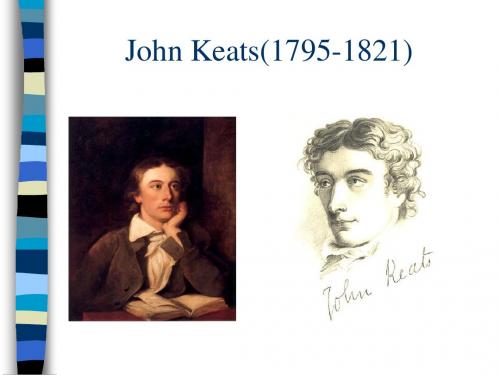
Stanza 3
Ah, happy, happy boughs! that cannot shed Your leaves, nor ever bid the Spring adieu; And, happy melodist, unwearied, For ever piping songs for ever new; More happy love! more happy, happy love! For ever warm and still to be enjoy’d, For ever panting, and for ever young; All breathing human passion far above, That leaves a heart high-sorrowfuland cloy’d, A burning forehead, and a parching tongue.
Analysis
Stanza 5: came back to the urn as a whole,reflecting the well-organized structure of the ode.Finally,the poet point out the relation between art and reality:Beauty is truth,truth beauty. What should be emphasized here is that :the poet felt the beauty by heart,and imagination plays an important role in this process.
对小镇的描写是非常富有现实意义的。小镇是这队祭祀行列的出 发点,又是这些村民们劳动生活的中心,通过对它们的联想,一 幅幅社会风俗画就会展现在我们面前。古瓮的图案不可能描绘小 镇的荒芜和静寂,但诗人的想象力却看到了这一点。村镇被遗弃 了,这不单是因为出走的人个个被禁锢在瓮上,也是因为那镇上 的人早在很久以前就消失了,唯有这古瓮上雕刻着的还栩栩如生。 这样,诗人又一次表明了他的信念:艺术是不朽的。
诗人 约翰济慈(英文版)

complaint once that I only lov'd your Beauty.you any more: not will I any more believe
Have I nothing else then to love in you but you can have the least pique against me.
No ill prospect has been able to turn your -- Remembrances to your Mother.
thoughts a moment from me.
Your affectionate, J. Keats
His last request :to be buried under an unnamed tombstone, with words
Life Story
1795 born
1804 father
1810 mother
1811 surgeon-apothecary
外科药剂商
1815-1816 Studied & licensed apothecary ed
The last year of his life
the gracefullest. When you pass'd my
concentrate my whole senses. The anxiety
window home yesterday, I was fill'd with as shown about our Love in your last note is
“Beauty is truth, truth beauty” 美即是真,真即是美
济慈
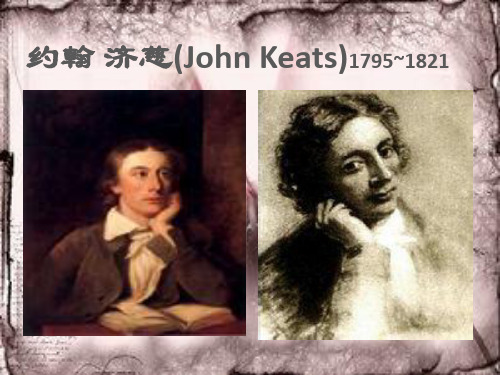
Life in Imitation of 1814年,创作了他的第一首诗Lines
Spenser《仿斯宾塞》 1818年年底,济慈搬到汉普斯泰德(Hampstead)在那 里,济慈遇见并深深的爱上了一位年轻的女邻居,芬 妮· 布朗(FannyBrawne)。 1820年3月,济慈第一次咳血,之后不久,因为迅速恶化 的肺结核,1821年2月23日,济慈于去意大利疗养的途中 逝世,安葬在英国新教徒公墓。去世的时候,只有年轻而 忠诚的朋友画家塞文陪伴着他。
Features
Keats’
poetry is colorful and rich in imagery ,which expresses the acuteness of his senses and known as a sensuous poet (给人以 美的享受的诗人). He has the power of entering the feelings of others-either human or animal. He draws diction, style and imagery from works of Shakespeare, Milton and Dante. He delights to dwell on beautiful words and phrases which sound musical. With vivid and rich images, he paints poetic pictures full of wonderful color.
Long poems
Works
Endymion《安狄弥翁》 Isabella,or The Pot of Basgnes《圣亚尼节前夜》
Lamia《莱米亚》 Hyperion《许佩里恩》
《济慈简介英文版》课件

In 1817, Keats published his first collection of poetry, "Poems," which received mixed reviews
Keats' later poetry is more personal and exploratory, often exploring themes of morality, love, and nature
Detailed description
This poem symbolizes the nightingale and expresses the poet's thoughts on life, death, and eternity. Keats depicts a world full of beauty and pain through the image of a nightingale, while also expressing his love for poetry and art.
Hyperion is a novel by Keats, renowned for its profound themes and unique poetic style.
Summary
This novel is set in ancient Greek mythology and tells a story about love, death, and eternity. Keats expressed his love for poetry and art, as well as his reverence for life and nature, through the image of Hyperion. This novel, with its profound themes and unique poetic style, has become one of Keats' most famous works.
济慈简介英文版

The Genius of Poetry must work out its own salvation in a man; it cannot be matured by law and precept, but by sensation and watchfulness in itself
Writing features
What is creative must creative itself.
Keats restricted his application of the principle of liberty to the sphere of Art.
His pursuit of his Beauty in all things bespoke an aspiration after a better life than the sordid reality under capitalism.
On his tomb are carved, according to his own request ,the words: “Here lies one whose name was written in water.” (此地长眠者,声名 水上书)
Works
Long poems
Endymion (恩底弥翁) Isabella (伊莎贝拉) The Eve of St.Agnes (圣爱格尼斯前夜) Lamia (拉米亚) Hyperion (赫珀里昂) Bright Star《灿烂的星》 When I have fear 《每当我恐惧》 Ode to Autumn 《秋颂》 Ode on Melancholy 《忧郁颂》 Ode on a Grecian Urn 《希腊古翁颂》 Ode to a Nightingale 《夜莺颂》
john keats名词解释
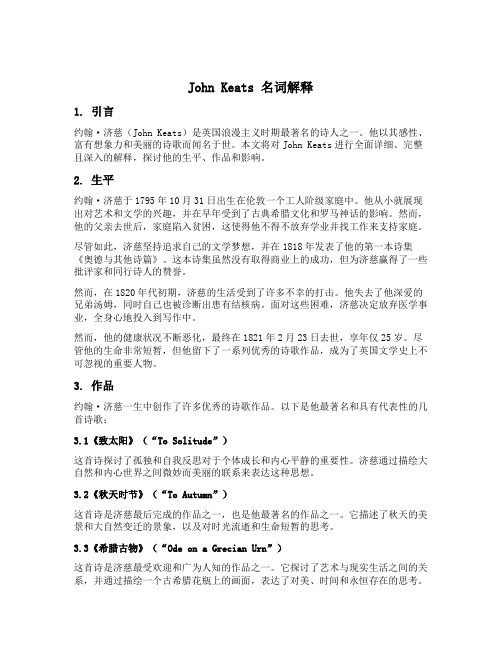
John Keats 名词解释1. 引言约翰·济慈(John Keats)是英国浪漫主义时期最著名的诗人之一。
他以其感性、富有想象力和美丽的诗歌而闻名于世。
本文将对John Keats进行全面详细、完整且深入的解释,探讨他的生平、作品和影响。
2. 生平约翰·济慈于1795年10月31日出生在伦敦一个工人阶级家庭中。
他从小就展现出对艺术和文学的兴趣,并在早年受到了古典希腊文化和罗马神话的影响。
然而,他的父亲去世后,家庭陷入贫困,这使得他不得不放弃学业并找工作来支持家庭。
尽管如此,济慈坚持追求自己的文学梦想,并在1818年发表了他的第一本诗集《奥德与其他诗篇》。
这本诗集虽然没有取得商业上的成功,但为济慈赢得了一些批评家和同行诗人的赞誉。
然而,在1820年代初期,济慈的生活受到了许多不幸的打击。
他失去了他深爱的兄弟汤姆,同时自己也被诊断出患有结核病。
面对这些困难,济慈决定放弃医学事业,全身心地投入到写作中。
然而,他的健康状况不断恶化,最终在1821年2月23日去世,享年仅25岁。
尽管他的生命非常短暂,但他留下了一系列优秀的诗歌作品,成为了英国文学史上不可忽视的重要人物。
3. 作品约翰·济慈一生中创作了许多优秀的诗歌作品。
以下是他最著名和具有代表性的几首诗歌:3.1《致太阳》(“To Solitude”)这首诗探讨了孤独和自我反思对于个体成长和内心平静的重要性。
济慈通过描绘大自然和内心世界之间微妙而美丽的联系来表达这种思想。
3.2《秋天时节》(“To Autumn”)这首诗是济慈最后完成的作品之一,也是他最著名的作品之一。
它描述了秋天的美景和大自然变迁的景象,以及对时光流逝和生命短暂的思考。
3.3《希腊古物》(“Ode on a Grecian Urn”)这首诗是济慈最受欢迎和广为人知的作品之一。
它探讨了艺术与现实生活之间的关系,并通过描绘一个古希腊花瓶上的画面,表达了对美、时间和永恒存在的思考。
- 1、下载文档前请自行甄别文档内容的完整性,平台不提供额外的编辑、内容补充、找答案等附加服务。
- 2、"仅部分预览"的文档,不可在线预览部分如存在完整性等问题,可反馈申请退款(可完整预览的文档不适用该条件!)。
- 3、如文档侵犯您的权益,请联系客服反馈,我们会尽快为您处理(人工客服工作时间:9:00-18:30)。
John Keats was born in London on October 31st, 1795. The first son of a stable-keeper, he had a sister and three brothers, one of whom died in infancy. When John was eight years old, his father was killed in an accident. In the same year his mother married again, but little later separated from her husband and took her family to live with her mother. John attended a good school where he became well acquainted with ancient and contemporary literature. In 1810, his mother died of consumption, leaving the children to their grandmother. Under the authority of the guardians, he was taken from school to be apprentice to a surgeon. In 1814, before completion of his apprenticeship, John left his master after a quarrel, becoming a hospital student in London. Under the guidance of his friend Cowden Clarke, he devoted himself increasingly to literature. In 1816 Keats became a licensed apothecary, but he never practiced his profession, deciding instead to write poetry.
Apart from helping Tom against consumption, Keats worked on his poem "Endymion". Just before its publication, he went on a hiking tour to Scotland and Ireland with his friend Charles Brown. First signs of his own fatal disease forced him to return prematurely, where he found his brother seriously ill and his poem harshly critisized.
? the lasting power of beauty and its union with truth
? Major subject matters of his poems –love & beauty and suffering & death
His position in English litarature
His writing career lasted a little more than five years (1814-1820), and three of his great odes--"Ode to a Nightingale," "Ode on a Grecian Urn," and "Ode on Melancholy"--were written in one month. Most of his major poems were written between his twenty-third and twenty-fourth years, and all his poems were written by his twenty-fifth year. In this brief period, he produced poems that rank him as one of the great English poets. He also wrote letters which T.S. Eliot calls "the most notable and the most important ever written by any English poet."
Here lies one whose name was written in water .此地长眠者,声名水上书。
Major wokes
John Keats lived only twenty-five years and four months (1795-1821), yet his poetic achievement is extraordinary.
ቤተ መጻሕፍቲ ባይዱ
Major Features of Keats’s Poetry
? Characterized by exact and closely knit construction, sensual description, force of imagination
? Sight, sound, scent,taste and feeling are all taken in to give an entire understanding of an experience
He continued a correspondence with Fanny Brawne and—when he could no longer bear to write to her directly—her mother, but his failing health and his literary ambitions prevented their getting married. Under his doctor's orders to seek a warm climate for the winter, Keats went to Rome with his friend Shelly . He died there on February 23, 1821, at the age of twenty-five, and was buried in the Protestant cemetery.
Known as a sensuous and romantic poet
A voice through which beauty expresses itself
He is, like Shakespeare, Milton and Wordsworth, one of the indisputable great English poets. And his mighty poems will no doubt have a lasting place in the history of English literature
Published his first important poem “On First Looking into Chapman’s Homer” in 1816
Five long poems – Endymion(1818),Isabella, The Eve of St. Agnes, Lamia , Hyperion
In December 1818 Tom Keats died. John moved to Hampstead Heath, and he lived in the house of Charles Brown. While in Scotland with Keats, Brown had lent his house to a Mrs Brawne and her sixteen-year-old daughter Fanny. Since the ladies where still living in London, Keats soon made their acquaintance and fell in love with the beautiful, fashionable girl.
? his greatest odes--"Ode to a Nightingale," "Ode on a Grecian Urn," and "Ode on Melancholy"
? The third and best of his volumes of poetry(1820).
Endymion, a four-thousand-line erotic romance based on the Greek myth of the same name, appeared in 1817. Two of the most influential critical magazines of the time, the Quarterly Review and Blackwood's Magazine, attacked the collection. Calling the romantic verse of Hunt's literary circle "the Cockney school of poetry," Blackwood's declared Endymion to be nonsense and recommended that Keats give up poetry.
